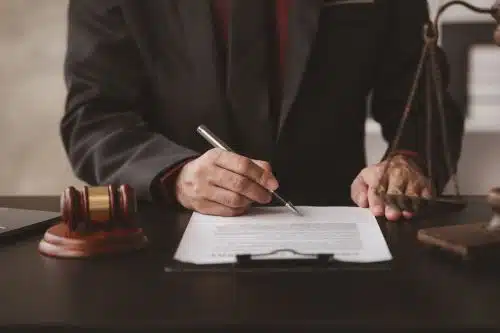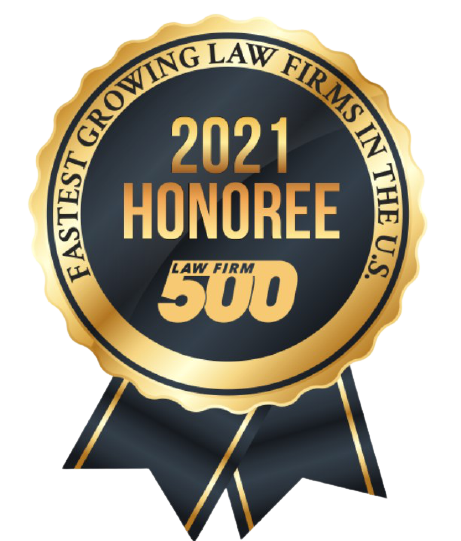You are in good hands with Ali Awad. He is a professional who knows what it takes to get the insurance company’s attention and maximize results for his clients. He is knowledgeable, an excellent communicator and truly cares about his clients. If anyone needs a personal injury attorney in the Atlanta metropolitan area, I would have no hesitation in recommending Ali Awad and his talented staff.

A South Carolina Personal Injury Attorney Can Help You Seek Compensation
We’ll review your case and advise you of your options for seeking compensation. We may also be able to help if you’ve already filed an insurance claim and received a denial or have difficulties recovering your damages. In many situations, we can gather more evidence and execute a strategy to win or settle your case.
But what if you’re unsure who was at fault or even how your accident or injury happened? That’s not unusual. Many injuries—even severe ones—occur in only a few seconds. It can be hard to clearly recall what happened when your injury resulted in pain or other distractions. If you suspect someone else caused your injury but aren’t sure, please speak with a personal injury attorney who can help you find clarity and learn more.
The CEO Lawyer Personal Injury Law Firm is always available for a free consultation about your injury or accident. There is no obligation, and if we do take your case, you won’t owe us anything until we win or settle it. You have nothing to lose by learning more, so please contact us today to explore your options.
Who Is At Fault For Your Injuries?
This is the pivotal question in many cases. Even if there is evidence that another party is at fault, their insurance company may claim you were at least partly responsible. Because South Carolina uses modified comparative negligence statutes, an injured person can collect damages if their percentage of fault is below 51 percent. Still, their damages will be reduced by whatever percentage of fault is assigned to them.
You can probably see why it’s beneficial for the insurance company to argue that the injured party was somewhat responsible—they don’t have to prove you were 100 percent at fault to save money. Even if you were only 10 or 20 percent to blame, they could drastically reduce the amount they must pay. If they build a strong argument that you were 51 percent responsible, they will be entirely off the hook.
But Who Assigns Fault For Your Personal Injury?
In many cases, one or both insurance companies. Car accident cases, for example, are often decided by the insurance companies representing both drivers. Adjusters for the two companies will negotiate and eventually agree about who pays for what. During this process, both may call and ask you questions about the accident.
Unfortunately, this process can be tricky. Although you may speak thoughtfully and believe you made it clear you were not at fault, the insurance adjuster could misinterpret any innocent comment you make. Also, you should be aware that these calls are typically recorded—the insurance company will usually inform you of this with a brief message about using the recordings to “serve you better,” etc. However, they will also use the recordings to pick apart everything you say in search of an excuse to deny or reduce your claim. For this reason, we recommend that you speak to an attorney before giving a statement to either insurance company (even your own).
If you don’t have a lawyer, your insurance company’s adjuster will still argue that you weren’t at fault because they don’t want to pay the claim. But unlike an attorney who works for you, this adjuster works for the insurance carrier, and their main objective is to save the insurance company money. They might, for instance, agree to a higher percentage of fault on your part if it’s still below 51 percent because it won’t cost them anything. You, on the other hand, could lose a significant chunk of your recovery.
Both adjusters may also undervalue your claim, which we’ll discuss later.
What About the Police Report?
In a car accident or another situation in which the police are called, there is typically a police report. (However, it’s important to note that personal injuries can occur in other situations where there usually isn’t one, such as medical malpractice.) A car accident report uses a standard form, which includes space for the officer to draw a diagram of how they think the accident happened. They will also take statements from both drivers and other witnesses, observe evidence at the scene (such as vehicle damage), and fill out a section stating how they believe the accident occurred. While the officer’s opinion carries a lot of weight, it is still an opinion, and it can be challenged if we find evidence to the contrary.
Do You Have to Go to Court For Your Personal Injury Case?
Probably not. Depending on the situation, we may file a lawsuit, but that doesn’t necessarily mean your case will be resolved in a trial. In most cases, we negotiate a settlement with the insurance company or at-fault party, and the situation is concluded without the need for a stressful and time-consuming trial.
In a few cases, the insurance carrier or other party won’t agree to a reasonable deal. If this happens, we are prepared to argue your case in court. Our earlier efforts to gather evidence and establish a solid strategy to win the case will be beneficial when we go to trial.
Was It A Personal Injury Or Just An Accident?
This is an important question to consider. While some people believe another party is responsible for their injuries almost immediately, others may not immediately realize it. Some may only consider the possibility of negligence when a friend or family member points it out, or they might dismiss the situation as “bad luck.”
Your lawyer will consider whether your injury meets the four qualifications for negligence, which is the basis of most personal injury claims. These are the four factors to consider:
Did the defendant have a duty of care? The duty differs with the situation, but in most circumstances, we all have a duty to avoid careless or reckless behavior that might increase the risk of harm to others. A property owner, for instance, has a duty to address hazards that could cause injury to guests, such as a loose floor tile that might trip someone.
Was this duty of care breached? In other words, did the defendant fail at their duty? For example, perhaps the property owner knew there was a loose floor tile but didn’t take steps to get it repaired or warn guests (such as a “Caution” sign or roping off the area around the tile).
Did the breach of duty of care cause the injuries? It will be necessary to show that the injuries would not have happened but for the defendant’s careless action. You would not have broken your arm if not for the unaddressed loose floor tile; you wouldn’t have suffered a head injury if a drunk driver hadn’t crashed into your car, etc.
Did you suffer actual damages because of the defendant’s failed duty of care? We will use medical records, financial documents, expert testimony, and other evidence to link your damages to the breached duty of care.
If you still aren’t sure whether another party was negligent, that’s understandable. Negligence isn’t always apparent to the average person. Additionally, injuries tend to be painful and distracting, and you may not remember all the details of your injury. As a result, it’s easy to think that it was just an unavoidable accident. For instance, you might assume you fell because you simply tripped over your own feet—but was that really what happened? Was there an obstruction on the floor that you didn’t see?
If you have any questions or concerns about your injuries or potential liability, we recommend speaking with a personal injury lawyer as soon as you can. Sometimes, evidence is lost over time, and it may be more difficult to determine fault if you wait weeks or months to seek advice.
What Are the Most Common Types of Personal Injury Cases?
It’s important to understand that you may still have a potential claim even if your injury or accident doesn’t fit neatly into one of these categories. Still, these are some common situations that often lead to personal injury claims:
Motor Vehicle Accidents
This is often the first thing that comes to mind when someone thinks about personal injury law. Although it’s certainly not the only type of personal injury, motor vehicle accidents are a highly prevalent cause of injury and death, so this is one of the categories we see more frequently.
Traffic accidents go beyond car collisions as well. Some cases involve crashes with semi trucks, buses, RVs, motorcycles, or a bicyclist or pedestrian hit by a larger vehicle. If you were injured on a highway, chances are your case falls into the motor vehicle accidents category.
Most people involved in car accidents have at least the required car insurance coverage. However, there are still several possible obstacles to obtaining the settlement you deserve for your car accident:
Disagreements about who is at fault. Remember that not every car accident is entirely one driver’s fault. But, as we discussed earlier, the insurance adjusters working on your case could overestimate your portion of culpability, or they might assign some of the blame to you when you did nothing wrong. The best way to ensure you receive a fair accounting of fault is to speak with a personal injury lawyer as soon as possible.
Undervaluation of your claim. Sometimes, people think their problems are over when they receive a settlement offer from the insurance company. The potential issue is that the insurance adjuster may have offered them much less than the claim is worth—this is common with first offers. Because it’s difficult to value your own claim and ensure all your damages are accounted for (including future medical costs, pain and suffering, etc.), we recommend consulting an attorney before accepting any offer. An experienced personal injury lawyer will review your injuries and their effects on your life and help you determine a fair valuation for your claim, then compare it to the insurance company’s offer. If it’s insufficient, we can also negotiate with the insurer for a better deal.
Inadequate insurance coverage. There are multiple issues with the amount of coverage available: The at-fault driver may be completely uninsured; the at-fault driver could have insurance but not enough to cover all your damages; you may not have enough insurance coverage to compensate for the at-fault driver’s insufficient coverage. Although we will make every effort to recover damages from the at-fault driver and/or their insurance company, we still advise adding extra coverage to your policy in case of situations where this isn’t possible.
South Carolina requires uninsured/underinsured motorist coverage (UM/UI) equal to the required amounts for liability coverage—$25,000 per person in bodily injury liability ($50,000 per accident) and $25,000 for property damage. However, you can purchase more coverage, and this is highly recommended. If you’re in a serious accident with an uninsured or underinsured driver, UM/UI may be your only option for recovering damages.
Additionally, we recommend Medical Payments (MedPay), Collision, and Comprehensive coverage, although the state does not require these policies. MedPay will cover your medical expenses for car accident injuries regardless of fault, which is beneficial when there isn’t enough evidence to prove another driver was responsible. Collision coverage pays for car repairs no matter who is at fault. Comprehensive deals with vehicle damage not caused by collisions with other drivers—for example, damage from weather, theft, vandalism, acts of nature, etc.
Boating Accidents
With more than 187 miles of coastline, South Carolina has many opportunities for boating and other water or beach activities. Unfortunately, not everyone follows local regulations or safe boating practices. In 2022, the state saw 170 boating accidents, including 22 fatalities.
Assigning fault in a boating accident can be complicated as multiple parties may have caused or contributed to the accident:
The boat’s captain or operator.
The boat’s owner. If the boat crashed due to a lack of proper maintenance, the owner may be at fault.
The captain or operator of another watercraft that hit yours.
The boat manufacturer. This is possible if a defect in the boat or one of its components causes it to malfunction and crash.
A service company. If we find evidence the service worker made a mistake, such as installing a component incorrectly, and that error led to the accident, the company could be responsible.
Passengers. Usually, passengers are not responsible for boating accidents, but occasionally, we see situations where a passenger tries to grab the boat’s controls or knocks another passenger overboard while horsing around.
Boat insurance is not required in South Carolina, but boats aren’t cheap, and most people will choose to protect their investments with insurance. Often, there is a liability policy available if the boat owner is at fault or if a defective product or service caused the accident. Your attorney will help you establish culpability and identify the insurance coverage available.
Other Recreational Vehicles
Golf carts, ATVs, and other small, low-speed vehicles are popular for outdoor activities in South Carolina. Unfortunately, their low speeds don’t always prevent accidents or injuries. As with boat accidents, there are multiple potentially liable parties in these situations, and you shouldn’t assume you know who is at fault. If you’ve been hurt in a recreational vehicle accident, please speak with an experienced attorney to learn more about your options.
Property Owner Liability
Sometimes called “premises liability,” this category includes accidents or injuries on either public or private property due to the owner’s negligence. Slip-and-fall or trip-and-fall accidents are very prevalent, but there are other ways to be injured on another party’s property. Falling objects, pool accidents, and negligent security are other examples of premises liability.
The key to these cases is establishing that the owner knew or should have known about a hazard and failed to correct the problem or warn guests away. For instance, if you slip and fall on a puddle caused by a leaky roof at your local pizza restaurant, we will work to learn more about how long the roof has been leaking. If several employees tell us the leak began months ago and the owner is trying to find someone to fix it, the restaurant may be negligent. It’s not necessarily their fault if all the local roofers are currently booked, but in the meantime, the restaurant has a responsibility to warn guests about the potential hazard. For example, they could place a bucket to collect the water and a “Wet Floor” sign to attract guests’ attention to the hazard. If they fail to take even these simple steps, the restaurant could be negligent.
Negligent security cases usually involve situations where the property owner should have anticipated a potential threat and arranged for reasonable security measures. Often, this is related to previous crimes in the neighborhood, at the location, or basic safety measures for the industry. One example would be if you were mugged in the parking lot of a clothing store, and we learned that there had been several other muggings reported recently at nearby stores. A reasonable store owner might improve security by fixing broken lights in the parking lot, adding security cameras, etc. If they didn’t respond to the threat with some effort to keep shoppers safe, they might be negligent.
What Is An Attractive Nuisance?
Attractive nuisances are objects or hazards that are not inherently dangerous to everyone but could threaten small children who haven’t yet learned to appreciate the risks. Some examples might be a swimming pool, a rusted swingset, or a collection of old washers and dryers in a backyard.
In most other premises liability cases, a property owner’s duty to trespassers or those who are on the property illegally is only to refrain from willfully harming them. The owner has no duty to fix or warn about a hazard if they are not expecting guests.
However, there are sometimes exceptions when it comes to children—again, because a child may not know what they’re doing or understand the threat. Suppose the property owner knows that children might trespass on the property due to the location, and they have reason to believe the object or condition could be hazardous to a child. In that case, they have a duty to prevent children from accessing the hazard. For instance, if you have a pool in your backyard, and you know your next-door neighbors have several small children, you might consider erecting a backyard fence so a toddler can’t accidentally fall in the pool and drown.
If your children were harmed by an object or condition that you believe was an “attractive nuisance,” we encourage you to speak with an attorney to learn more.
How Can You Get Legal Advice From A South Carolina Personal Injury Law Firm?
Please contact the CEO Lawyer Personal Injury Law Firm for a free consultation. We believe everyone should be able to learn their legal options at no charge or obligation, so there is no reason to wait. We’ll review the details of your case, answer your questions, and explain your options. If we take your case, we won’t charge you anything until we win or settle it.
Attorney Ali Awad founded the CEO Lawyer Personal Injury Law Firm, which is now one of the fastest-growing law firms in the country. He and his team have over twenty years of combined experience and a 99.5 percent success rate. As a result, they’ve recovered millions of dollars in compensation for injured people and their families. When he’s not working on a case, you can find Mr. Awad on social media, delivering entertaining yet educational videos about legal topics to more than a million followers.




















